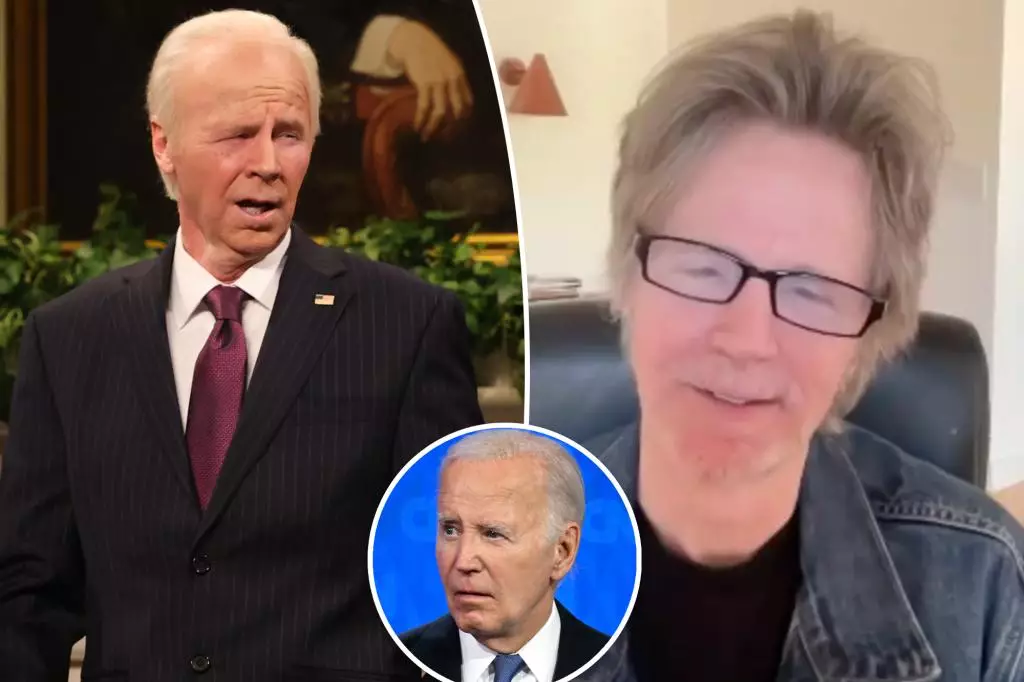Dana Carvey’s return to “Saturday Night Live” (SNL) is not merely a revival of one of the most beloved comedians in sketch comedy; it also reflects a nuanced relationship between humor and contemporary politics. Carvey emerged from the shadows of his previous tenure with a renewed purpose, eager to bring his unique flavor of comedy back to a nation polarized by political strife. His reprisal, unlike most, was sparked by the very man who once held the highest office in the land—President Joe Biden.
Carvey, at the seasoned age of 69, found himself once again in Lorne Michaels’ orbit. Michaels, the long-time executive producer of SNL, possesses an uncanny ability to draw talent back in with tempting promises. Carvey shared an amusing anecdote abouthow Michaels persuaded him by pitching an enticing six-week stint in New York City. “It’ll be Autumn in New York… then afterwards you can tell us to f—k off,” he quipped, admiringly imitating Michaels’ voice. It was an invitation too good to refuse, but amid a flurry of political turbulence, Carvey’s comic forecast quickly turned cloudy.
The New Political Landscape
This exuberance rapidly transitioned into foresight. Carvey watched as the politically charged atmosphere unfolded during a pivotal debate that would not only alter the trajectory of Biden’s campaign but also refine Carvey’s intentions to impersonate him. Following a rather tense moment in the spotlight, Carvey turned to his wife, sensing what was about to unfold. “I said, ‘We’re not going to New York’,” he candidly recalls, perfectly encapsulating the absurdity of political life and comic timing. His intuition proved prescient, as the race’s dynamics shifted, ushering in Kamala Harris as the new Democratic standard-bearer.
Despite the initial whiplash of his plans, Carvey’s eventual return included ten humorous episodes where he aligned himself with other SNL heavyweights, including Maya Rudolph and Jim Gaffigan. Carvey flourished in his role, making light of the confounding nature of Biden’s public persona. Adopting an array of physical comedic tropes, his impersonation featured familiar quirks like face-scratching and absentmindedly picking up toys—a brilliant contrast to the tumultuous political climate.
The Delicate Balance of Parody
What stands out in Carvey’s approach is his inherent respect for the personalities he portrays. He did not aim to shred political figures through ruthless satire but rather focused on illuminating the quirks that make us human. “I’m not trying to really make political points or put them down,” Carvey explained, highlighting his intent to explore the absurd while ensuring that humor does not devolve into ridicule for the sake of cruelty. This philosophy reflects Carvey’s maturation as a comedian, suggesting an awareness that laughter can foster connection rather than division.
Carvey’s deftness at creating humor out of humanity was similarly felt during his earlier role as George H.W. Bush, where his impersonation was so admired that the real Bush invited him to the White House post-election. Imagine a young comedian grappling with the reality that his humor transcends entertainment to become a relatable bridge. Carvey’s charm and mastery of impersonation provide an essential commentary on the comedy landscape, where being genuine can ironically make the outrageous even more relatable.
Carvey’s Enduring Legacy
Even as Carvey remains tethered to the legacy of SNL, he has not limited himself to the small screen. His podcast alongside David Spade continues to illuminate lively discussions about showbiz’s underbelly while reflecting on moments that shaped comedic history. Their dialogues shed light on the camaraderie of comedians cast in the often-chaotic spotlight of fame, merging personal anecdotes with professional insights.
As we navigate an increasingly complex socio-political landscape, Carvey stands as a testament to the timeless nature of comedy. His ability to make us laugh at those in power prompts a critical examination of both our leaders and our own roles in creating a more humorous, connected world. In a time where satire can serve as fuel for further polarization, Carvey’s art reminds us of the power of empathy wedded to comedy, illustrating that sometimes the best laughter emerges from the heart).

